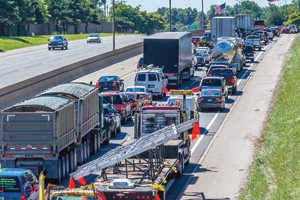Mich. Voters Reject Sales-Tax Hike Central to Transportation Package

This story appears in the May 11 print edition of Transport Topics.
Michigan voters last week overwhelmingly defeated a ballot measure that would have raised the state sales tax to 7% from 6% as the key element in a sweeping transportation funding plan that now is dead.
The measure on the May 5 ballot was defeated by a 4-to-1 ratio, losing in all 83 counties.
“While voters didn’t support this particular proposal, we know they want action taken to maintain and improve our roads and bridges,” Gov. Rick Snyder (R) said, echoing other disappointed supporters of the measure.
“I think there was just a volume of people who voted no because they were just mad at lawmakers for not doing their job,” said Lance Binoniemi, vice president of government affairs for the Michigan Infrastructure and Transportation Association, the construction industry trade group.
Legislators turned to the ballot after failing to come up with a plan to raise money for a road system that the American Society of Civil Engineers said in 2013 was so bad that Michigan drivers pay an extra $3.8 billion annually in vehicle repairs and operating costs.
“It’s pretty clear that it’s incumbent upon the Legislature to come up with a solution now,” Binoniemi said. “It’s a pretty frustrating situation.”
The construction industry contributed $5.8 million to the $10 million campaign to get the ballot measure passed, he said.
Walt Heinritzi, president of the Michigan Trucking Association, which supported the ballot measure said: “The proposal was too complicated; it involved too many moving parts. And a good percentage of the public felt as though the Legislature should have passed some sort of revenue package on its own without asking voters to do it.”
The ballot measure only asked voters to increase the state’s general sales tax. But had that passed, it would have triggered big changes in how Michigan pays for transportation and schools.
The state has a per-gallon tax of 19 cents on gasoline and 15 cents on diesel but also applies the 6% sales tax to fuel purchases — with the sales tax revenue dedicated to schools and local governments. There also is a .875-cent clean-up fee paid at the pump.
Together, at current fuel prices, the levies make up a tax of about 33 cents a gallon on gasoline and 31 cents on diesel, according to the American Petroleum Institute.
Had the ballot measure passed, per-gallon taxes would have been replaced with a 14.9% wholesale fuel tax.
The 6% sales tax on retail fuel purchases also would have been eliminated, and the proposed 7% sales tax rate would have helped replace the lost revenue for schools and local government.
In all, the funding plan was to have raised $1.2 billion more a year for roads — state and local — although that sum still would not have met the state’s backlog of needs, said Jeff Cranson, spokesman for the Michigan Department of Transportation.
“Many of the industry folks and outside experts would peg the [additional annual] need for all of Michigan . . . at closer to $2.5 billion,” Cranson said.
Snyder said that he would begin anew “to find a comprehensive, long-term solution to this problem.”
The ballot measure was defeated 1,405,715 to 349,813. It’s unclear whether lawmakers will see the wide margin as a sign that voters don’t want new taxes.
Snyder began pressing lawmakers to come up with road funding when he took office in 2011. The Republican and Democratic legislative leaders who worked with Snyder on the funding plan and ballot measure are no longer in office because of term limits.

